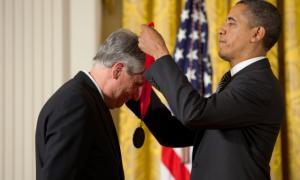President Obama Awards 2011 National Humanities Medals
A Nobel Prize-winning economist, a Pulitzer Prize-winning poet, a “scholar of the book,” and a national history program among this year’s recipients

Harvard historian and librarian Robert Darnton receives a National Humanities Medal for contributions to the humanities.
Credit: Official White House Photo by Pete Souza

Harvard historian and librarian Robert Darnton receives a National Humanities Medal for contributions to the humanities.
Credit: Official White House Photo by Pete Souza
President Barack Obama presented the 2011 National Humanities Medals to nine Americans for their outstanding achievements in history, literature, education, philosophy, and musicology. Medals were given to poet John Ashbery; economist and philosopher Amartya Sen; historians Robert Darnton and Teofilo Ruiz; philosopher Kwame Anthony Appiah; music scholar Charles Rosen; literary scholars Andrew Delbanco and Ramón Saldívar; and the educational program National History Day.
The National Humanities Medal honors individuals or groups whose work has deepened the nation’s understanding of the humanities, broadened our citizens’ engagement with the humanities, or helped preserve and expand Americans’ access to important resources in the humanities.
[Watch the White House video of the 2011 National Humanities Medals event on February 13.]
The official citations honoring the medalists are:
- Kwame Anthony Appiah, philosopher, for seeking eternal truths in the contemporary world. His books and essays within and beyond his academic discipline have shed moral and intellectual light on the individual in an era of globalization and evolving group identities. (Read profile.)
- John Ashbery, poet, for his contributions to American letters. Since his first book was published in 1956, he has been awarded nearly every prize available for poetry, including a Pulitzer Prize and the Grand Prix de Biennales Internationales de Poésie. One of the New York School poets, he has changed how we read poetry and has influenced generations of poets. (Read profile.)
- Robert Darnton, historian and librarian, for his determination to make knowledge accessible to everyone. As an author he has illuminated the world of Enlightenment and Revolutionary France, and as a librarian he has endeavored to make his vision for a comprehensive national library of digitized books a reality. (Read profile.)
- Andrew Delbanco, literary scholar, for his insight into the American character, past and present. He has been called “America’s best social critic” for his essays on current issues and higher education. As a professor in American studies, he reveals how classics by Melville and Emerson have shaped our history and contemporary life. (Read profile.)
- National History Day, a program that inspires in American students a passion for history. Each year more than half a million children from across the country compete in this event, conducting research and producing websites, papers, performances, and documentaries to tell the human story. (Read profile.)
- Charles Rosen, musician and scholar, for his rare ability to join artistry to the history of culture and ideas. His writings —about Classical composers and Romantic tradition—highlight how music evolves and remains a vibrant, living art. (Read profile.)
- Teofilo Ruiz, medieval historian, for his inspired teaching and writing. His erudite studies have deepened our understanding of medieval Spain and Europe, while his late examination of how society has coped with terror has taught important lessons about the dark side of western progress. (Read profile.)
- Ramón Saldívar, literary scholar, for his bold explorations of identity along the border separating the United States and Mexico. Through his studies of Chicano literature and the development of the novel in Europe and America, he beckons us to notice the cultural and literary markings that unite and divide us. (Read profile.)
- Amartya Sen, economist and Nobel laureate, for his insights into the causes of poverty, famine, and injustice. By applying philosophical thinking to questions of policy, he has changed how standards of living are measured and increased our understanding of how to fight hunger. (Read profile.)
The medals, first awarded as the Charles Frankel Prize in 1989, were presented during a ceremony in the East Room of the White House. After the ceremony, the medalists and their families and friends joined the President and First Lady Michelle Obama for a reception in their honor.
Since 1996, when the first National Humanities Medal was given, 133 individuals have been honored, inclusive of this year’s awardees. Ten organizations also received medals. Previous medalists include Pulitzer Prize winner Philip Roth, Nobel Prize winner Toni Morrison, novelist John Updike, Nobel Peace Prize laureate Elie Wiesel, sociologist Robert Coles, and filmmaker Steven Spielberg. A complete list of previous honorees is available at: http://www.neh.gov/about/awards/national-humanities-medals